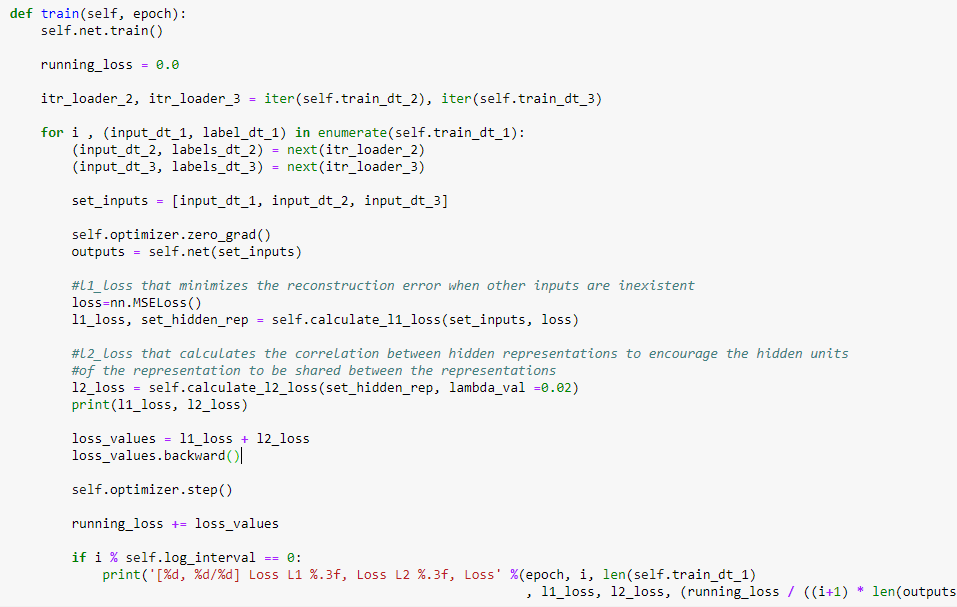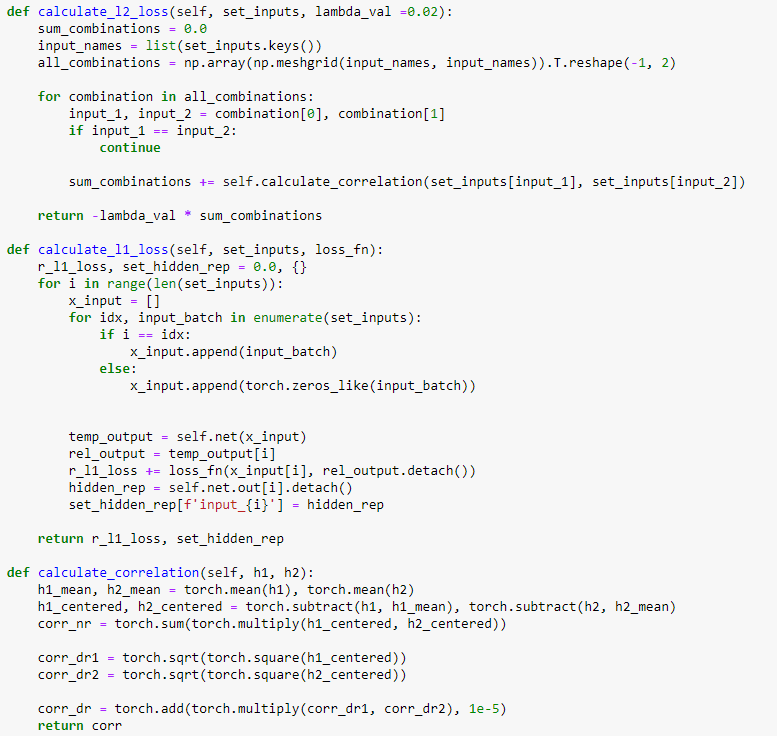I checked the previous solutions for the same problem, which advise to add detach to any intermediate result obtained from implementing the mode but to no avail.
Here is a snipped of the code and some of the functions used.
Could you post a minimal, executable code snippet reproducing the error, please?
You can wrap the code into three backticks ```, which makes debugging easier since we cannot copy the code from your screenshots.
Here is the full code.
from scipy.stats import pearsonr
class ModelTrainer:
def __init__(self, input_sizes, hidden_dim):
self.input_sizes = input_sizes
self.h_dim = hidden_dim
model_nn = self.ae_model()
self.net = model_nn
self.optimizer = torch.optim.SGD(self.net.parameters(),lr=1e-5)
self.train_dt_1, self.train_dt_2, self.train_dt_3 = self.generate_train_test_dts()
self.log_interval = 100
def generate_train_test_dts(self, batch_size=16):
X_1, y_1 = torch.randn(10000, 64), torch.randn(10000, 1)
X_2, y_2 = torch.randn(10000, 48), torch.randn(10000, 1)
X_3, y_3 = torch.randn(10000, 64), torch.randn(10000, 1)
train_dt_1 = TensorDataset(X_1, y_1)
train_dt_2 = TensorDataset(X_2, y_2)
train_dt_3 = TensorDataset(X_3, y_3)
dt_1_loader = DataLoader(train_dt_1, batch_size=16)
dt_2_loader = DataLoader(train_dt_2, batch_size=16)
dt_3_loader = DataLoader(train_dt_3, batch_size=16)
return dt_1_loader,dt_2_loader, dt_3_loader
def ae_model(self):
model_nn = Corr_Net(self.input_sizes, self.h_dim)
return model_nn
def calculate_l2_loss(self, set_inputs, lambda_val =0.02):
sum_combinations = 0.0
input_names = list(set_inputs.keys())
all_combinations = np.array(np.meshgrid(input_names, input_names)).T.reshape(-1, 2)
for combination in all_combinations:
input_1, input_2 = combination[0], combination[1]
if input_1 == input_2:
continue
sum_combinations += self.calculate_correlation(set_inputs[input_1], set_inputs[input_2])
return -lambda_val * sum_combinations
def calculate_l1_loss(self, set_inputs, loss_fn):
r_l1_loss, set_hidden_rep = 0.0, {}
for i in range(len(set_inputs)):
x_input = []
for idx, input_batch in enumerate(set_inputs):
if i == idx:
x_input.append(input_batch)
else:
x_input.append(torch.zeros_like(input_batch))
temp_output = self.net(x_input)
rel_output = temp_output[i]
r_l1_loss += loss_fn(x_input[i], rel_output.detach())
hidden_rep = self.net.out[i].detach()
set_hidden_rep[f'input_{i}'] = hidden_rep
return r_l1_loss, set_hidden_rep
def calculate_correlation(self, h1, h2):
h1_mean, h2_mean = torch.mean(h1), torch.mean(h2)
h1_centered, h2_centered = torch.subtract(h1, h1_mean), torch.subtract(h2, h2_mean)
corr_nr = torch.sum(torch.multiply(h1_centered, h2_centered))
corr_dr1 = torch.sqrt(torch.square(h1_centered))
corr_dr2 = torch.sqrt(torch.square(h2_centered))
corr_dr = torch.add(torch.multiply(corr_dr1, corr_dr2), 1e-5)
return corr
def train(self, epoch):
self.net.train()
running_loss = 0.0
itr_loader_2, itr_loader_3 = iter(self.train_dt_2), iter(self.train_dt_3)
for i , (input_dt_1, label_dt_1) in enumerate(self.train_dt_1):
(input_dt_2, labels_dt_2) = next(itr_loader_2)
(input_dt_3, labels_dt_3) = next(itr_loader_3)
set_inputs = [input_dt_1, input_dt_2, input_dt_3]
self.optimizer.zero_grad()
outputs = self.net(set_inputs)
#l1_loss that minimizes the reconstruction error when other inputs are inexistent
loss=nn.MSELoss()
l1_loss, set_hidden_rep = self.calculate_l1_loss(set_inputs, loss)
#l2_loss that calculates the correlation between hidden representations to encourage the hidden units
#of the representation to be shared between the representations
l2_loss = self.calculate_l2_loss(set_hidden_rep, lambda_val =0.02)
print(l1_loss, l2_loss)
loss_values = l1_loss + l2_loss
loss_values.backward()
self.optimizer.step()
running_loss += loss_values
if i % self.log_interval == 0:
print('[%d, %d/%d] Loss L1 %.3f, Loss L2 %.3f, Loss' %(epoch, i, len(self.train_dt_1)
, l1_loss, l2_loss, (running_loss / ((i+1) * len(outputs[0])))))```
Thank you for your help!Thanks, but it’s not executable as e.g. Corr_Net is undefined. Make sure you can copy/paste the posted code into a new script and directly execute it to reproduce the issue.
Here is the code for the Corr_Net:
class Corr_Net(nn.Module):
def __init__(self, input_sizes, hidden_dim):
super(Corr_Net, self).__init__()
self.encoders = nn.ModuleList()
for input_size in input_sizes:
self.encoders.append(
nn.Sequential(
nn.Linear(input_size, hidden_dim),
nn.ReLU()
))
self.decoders = nn.ModuleList()
for input_size in input_sizes:
self.decoders.append(nn.Sequential(
nn.Linear(hidden_dim, input_size),
nn.ReLU()
))
def forward(self, inputs):
out = []
for idx, enc in enumerate(self.encoders):
out.append(enc(inputs[idx]))
self.out = out
common_rep = out[0]
for i in range(1, len(out)):
common_rep = torch.add(common_rep, out[idx])
self.common_rep = common_rep
reconstructed_layer = []
for i in range(len(out)):
reconstructed_layer.append(self.decoders[i](out[i]))
return reconstructed_layer
m_t = ModelTrainer([64, 48, 64], 10)
for epoch in range(0, 5):
m_t.train(epoch)
Thanks for the update.
Your losses do not depend on any parameters used in the model as they are calculated using the inputs:
set_inputs = [input_dt_1, input_dt_2, input_dt_3]
self.optimizer.zero_grad()
outputs = self.net(set_inputs)
#l1_loss that minimizes the reconstruction error when other inputs are inexistent
loss=nn.MSELoss()
l1_loss, set_hidden_rep = self.calculate_l1_loss(set_inputs, loss)
#l2_loss that calculates the correlation between hidden representations to encourage the hidden units
#of the representation to be shared between the representations
l2_loss = self.calculate_l2_loss(set_hidden_rep, lambda_val =0.02)
As you can see, l1_loss is calculated using set_inputs and l2_loss using the output of calculate_l1_loss.
Thank you for your answer.
In calculate_l1_loss, I am using the network to obtain temp_output.
Yes, but you are detaching it, so these tensors are constants:
r_l1_loss += loss_fn(x_input[i], rel_output.detach())
hidden_rep = self.net.out[i].detach()
Thank you again for your answer. The issue is related to a type. The updated code for calculate_l1_loss and calculate_l2_loss is as follows:
def calculate_l2_loss(self, set_inputs, lambda_val =0.02):
sum_combinations = 0.0
input_names = list(set_inputs.keys())
all_combinations = np.array(np.meshgrid(input_names, input_names)).T.reshape(-1, 2)
for combination in all_combinations:
input_1, input_2 = combination[0], combination[1]
if input_1 == input_2:
continue
sum_combinations += self.calculate_correlation(set_inputs[input_1], set_inputs[input_2], lambda_val)
return sum_combinations
def calculate_l1_loss(self, set_inputs, loss_fn):
r_l1_loss, set_hidden_rep = 0.0, {}
for i in range(len(set_inputs)):
x_input = []
for idx, input_batch in enumerate(set_inputs):
if i == idx:
x_input.append(input_batch)
else:
x_input.append(torch.zeros_like(input_batch))
temp_output = self.net(x_input)
rel_output = temp_output[i]
r_l1_loss += loss_fn(x_input[i], rel_output)
hidden_rep = self.net.out[i]
set_hidden_rep[f'input_{i}'] = hidden_rep
return r_l1_loss, set_hidden_rep
def calculate_correlation(self, h1, h2, lambda_val):
h1_mean, h2_mean = torch.mean(h1), torch.mean(h2)
h1_centered, h2_centered = torch.subtract(h1, h1_mean), torch.subtract(h2, h2_mean)
corr_nr = torch.sum(torch.multiply(h1_centered, h2_centered))
corr_dr1 = torch.sqrt(torch.square(h1_centered))
corr_dr2 = torch.sqrt(torch.square(h2_centered))
corr_dr = torch.add(torch.multiply(corr_dr1, corr_dr2), 1e-5)
corr = torch.multiply(torch.divide(corr_nr, corr_dr), -lambda_val)
return torch.mean(corr)
Thank you for your help.

